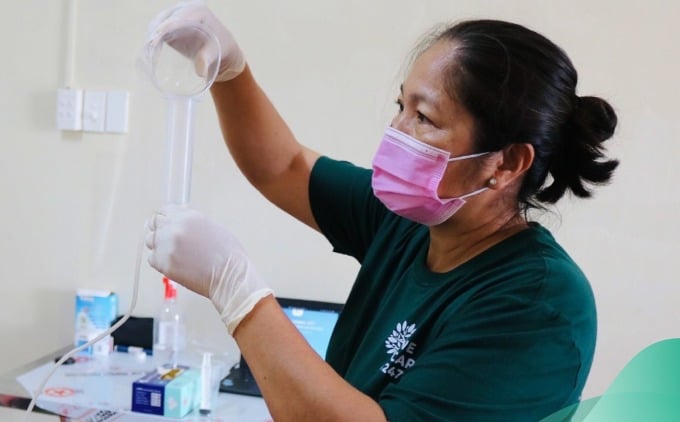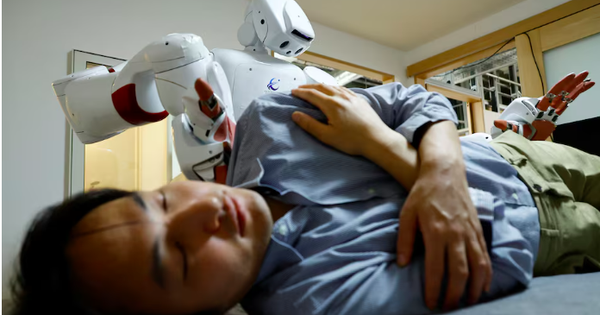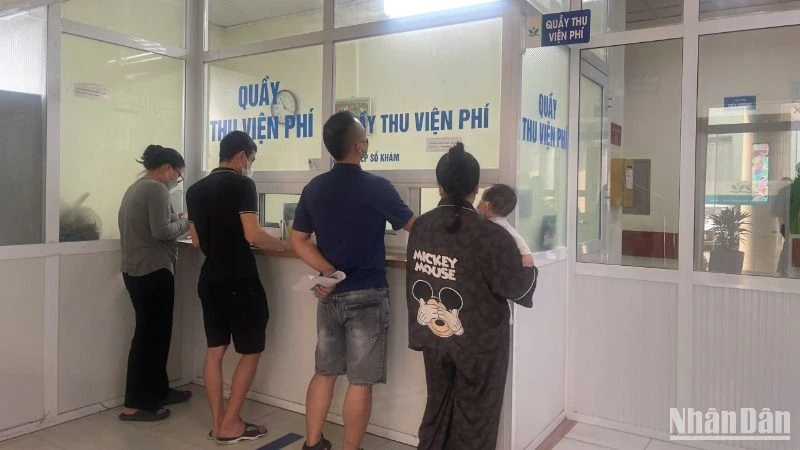Instead of returning to Ben Tre to celebrate Tet, Mr. Khanh, 40 years old, stayed in Ho Chi Minh City to take care of patients with an income of nearly one million VND per day, double the normal amount.
In the middle of the night, the 90-year-old man wanted to pee. Khanh woke up, helped him to the bathroom, and then took him back to bed. Three months ago, the company arranged for him to go to the hospital to take care of him, who was lying unconscious due to many underlying diseases such as arrhythmia, epilepsy, etc. The patient was discharged after three weeks, and the family asked him to continue taking care of him at their home in District 3. The old man lives with his daughter's family, while his two other children are abroad.
"I earn nearly ten million VND for 10 days of Tet, so I have no intention of going back to my hometown. Moreover, staying for a long time will make me fond of my hands and feet. My husband also doesn't want to change to someone else to take care of me while my daughter goes back to her husband's hometown to celebrate Tet," said Mr. Khanh.
Once a kitchen assistant at a large hotel in Ho Chi Minh City, with a salary of about 8-9 million VND, after deducting rent and food and travel expenses, the man could not save much. During the Covid-19 pandemic, he became unemployed and returned to his hometown. Someone advised him to take a job taking care of the sick because "the income is high, no need to spend money on food and accommodation because if you take care of them in the hospital, you will have free meals, if you stay at home, you will eat with their family". Moreover, this job has flexible hours, and the company can arrange for someone to replace you when you are busy with family matters.
At first, the old man weighed nearly 70 kg and was bedridden, so Mr. Khanh had to turn him around, change diapers, clean him, feed him, etc. Now, he is gradually recovering and can take care of his personal hygiene and eat. Mr. Khanh mainly supports him by his side to avoid him falling alone.
Having been involved in the job of taking care of patients for about a year, this is the first time he has stayed with patients during Tet. Seeing everyone returning home to reunite for the New Year, he "felt a little sad", but thinking that his children were still young, he had to try to go to work to earn money.
"I mainly go home to eat and drink during Tet," he said, adding that he often calls his wife to encourage her to take good care of the children during Tet.
Also the first time spending Tet with a sick person, Ms. Thu, 30 years old, is on duty at Nguyen Trai Hospital with an 80-year-old woman. She had just had a limb amputated 10 days ago due to complications from diabetes and has to stay in bed. The doctor plans to discharge her before Tet because her condition is better. The family asked her to follow her home to take care of her.
"My parents came from the North to Ho Chi Minh City to help me take care of my nearly 3-year-old child, who will go to school next year. The whole family is here during Tet, so I feel secure in registering to work," said Ms. Thu.
Previously, she worked as a waitress at a restaurant with an income of several million VND per month. After 7 months of taking care of her father-in-law who had cancer until he passed away, with many hospitalizations, she learned about this job and switched to it, because the work was regular and the income was stable.
Before starting the job, she was trained in the necessary skills. When her father-in-law was sick, he was upset and often got angry and spoke harshly to his children and grandchildren, so "now, no matter how difficult a patient is, I sympathize with them and consider them as relatives to take the best care of them," the woman shared.
At the end of the year, on social networking groups, the search for caregivers is also very busy. After posting information about the patient's condition and address, many people commented, wishing to take on the job. Many caregivers also proactively introduced themselves, leaving contact information for those in need to proactively contact.
Mr. Tuan Hung, a resident of District 10, said that his father had a stroke three years ago and had to depend on his family for almost all his daily activities, so every year during Tet he had to rely on a healthcare service to take his wife and children to their parents' house. "Without this service, my family would have a hard time getting around when we needed to go somewhere," said Mr. Hung.
There are currently no statistics on the number of people staying at home or in hospitals during Tet to take care of sick people, but representatives of some hospitals in Ho Chi Minh City said this service has increased over the years.

Many people choose to take care of sick people during Tet with double the usual salary. Photo: Khoi Nguyen
Mr. Nguyen Minh Tam, general director of a company specializing in providing caregivers in the medical field, said that about 60% of the staff registered to stay and take care of patients during Tet, with an income double that of normal days. The company's normal care prices range from 500,000-600,000 VND to about 900,000 VND, depending on the patient's condition. Thus, the salary of a staff member taking care of a sick person at home during Tet can be from one to two million VND per day, from the 25th of the lunar month to the 5th.
Many employees are taking care of patients at home, and have signed contracts with their families to stay on duty during Tet and not return to their hometowns. In some cases, the company will arrange for calls when inpatients in hospitals need care. "During Tet, most patients are discharged and go home, mainly in the intensive care and emergency departments," said Mr. Tam, adding that the company will arrange compensatory leave and support travel expenses for those who want to return home after Tet.
According to Master Le Minh Hien, Head of the Social Work Department, Cho Ray Hospital, caregivers are also considered relatives of patients, and all register to have their fingerprints scanned for management. During Tet, the hospital still provides free meals, twice a day, for caregivers in need.
Mr. Khanh plans to ask the company to arrange a replacement for him to go back to his hometown to visit his family for a few days after the 10th day of Tet. Doing a job that was previously chosen by mostly women, he said he will stick with it for a long time because he finds a lot of meaning in the job, contributing to helping many patients recover "in a time when everyone has few children and doesn't have much time to take care of their parents".
The Tet holiday of Mr. Khanh and the 90-year-old man also became warmer, because the two considered each other as family.
Le Phuong
Source link


![[Photo] Looking back at the impressive moments of the Vietnamese rescue team in Myanmar](https://vstatic.vietnam.vn/vietnam/resource/IMAGE/2025/4/11/5623ca902a934e19b604c718265249d0)




![[Photo] "Beauties" participate in the parade rehearsal at Bien Hoa airport](https://vstatic.vietnam.vn/vietnam/resource/IMAGE/2025/4/11/155502af3384431e918de0e2e585d13a)

























![[Photo] Summary of parade practice in preparation for the April 30th celebration](https://vstatic.vietnam.vn/vietnam/resource/IMAGE/2025/4/11/78cfee0f2cc045b387ff1a4362b5950f)




























































Comment (0)